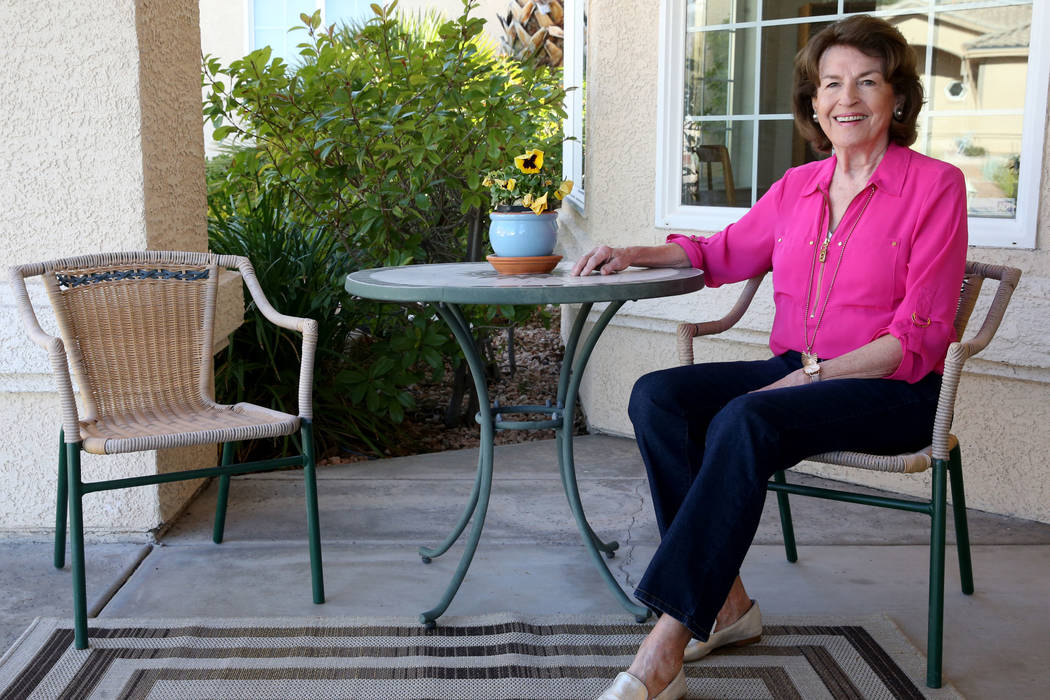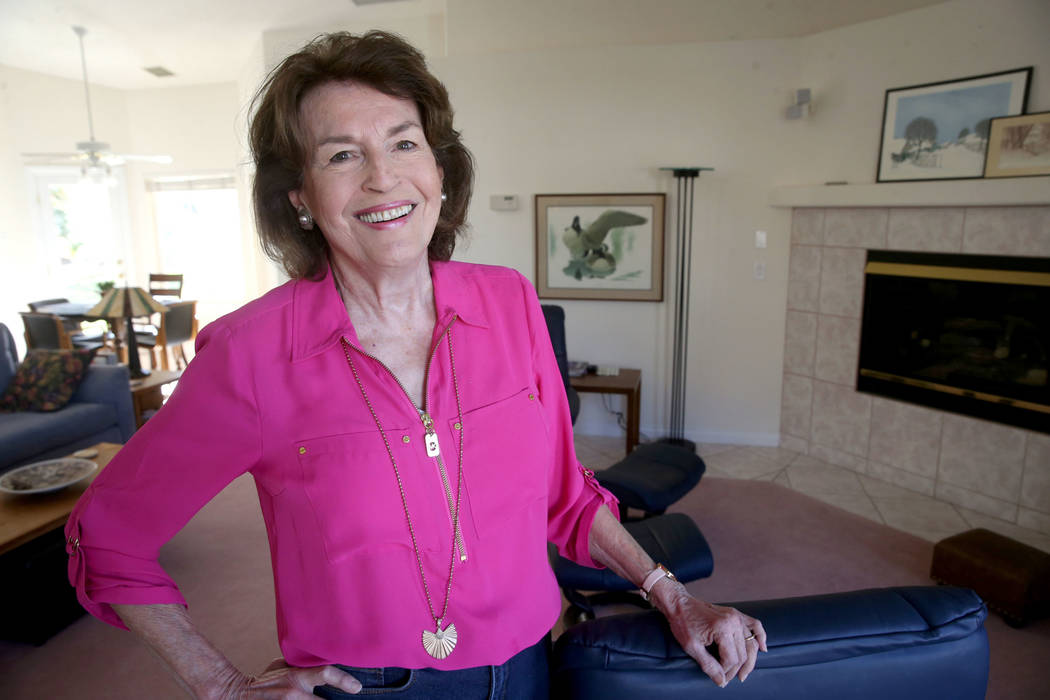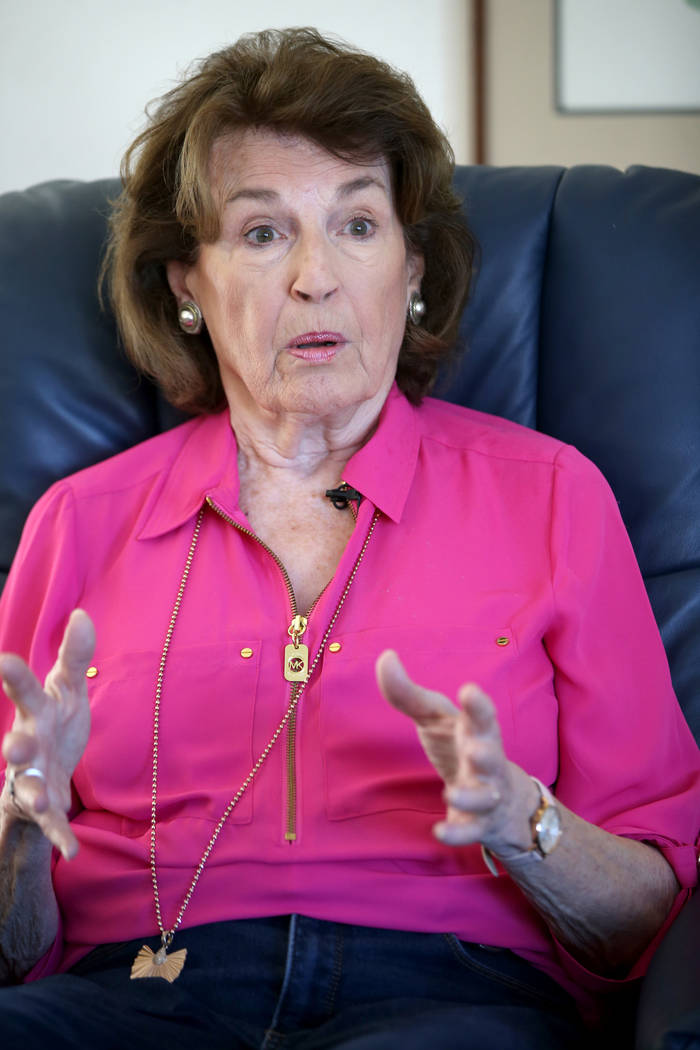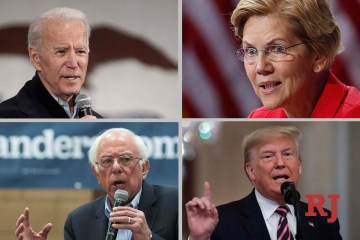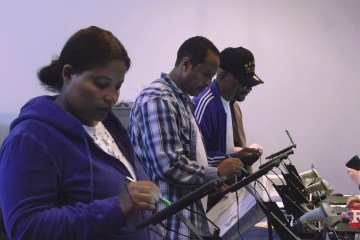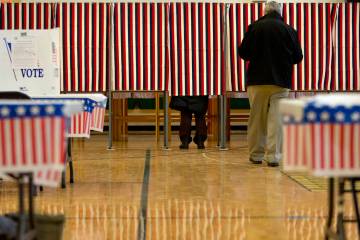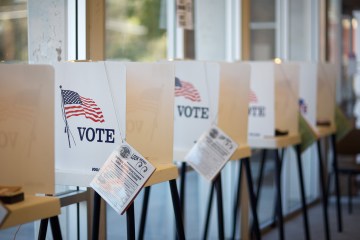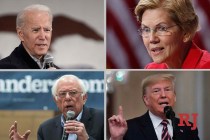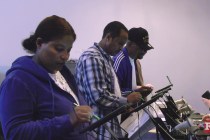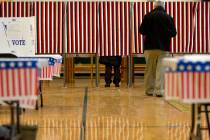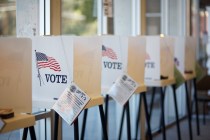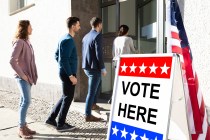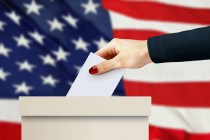What do nonpartisan voters in Nevada want? Moderation
Barbara Gruhl grew up in a conservative, Midwestern nest on a 500-acre grain and livestock farm in Illinois — “black gold farm country,” she remembers.
“One of my early memories is everybody loved Ike — all of the ‘I like Ike’ buttons,” said Gruhl, now 80 and living in Henderson. “People were naming their children after Dwight Eisenhower.”
She remained a Republican until her 60s, when she said the GOP’s pull to the right under the George W. Bush and Barack Obama administrations forced abortion-rights, anti-Iraq War moderates out of the party.
A retired biologist, Gruhl can name the carbon isotope in the carbon dioxide molecules whose rapid growth since the industrial revolution is considered evidence of climate change.
“It is appalling to me that the Republican Party is so embedded with the oil industry that they listen to their lobbyists completely and not to the science,” Gruhl said.
Gruhl is one of the nearly 350,000 voters — 22 percent of Nevada’s active voter base — who choose not to affiliate with one of the two major parties, despite state rules that limit their participation in partisan political races and presidential caucuses.
The Review-Journal interviewed nine of these nonpartisan voters from across the state. While their paths to nonpartisanship differ, most agreed on a number of key points: Government has become too partisan and unwilling to compromise.
Most agreed President Donald Trump must be defeated in 2020, while a few others voiced their support for the president or remain undecided.
‘My No. 1 issue is my wallet’
Steven Jeffers, a 58-year-old casino floor supervisor from Henderson, has a rosy interpretation of Trump’s tenure.
“One of the things I like about Trump is he made promises on the campaign trail, and he’s followed through on several of them,” Jeffers said. “You go all the way back to Reagan, both Bush presidencies, Clinton — that’s rare.”
Jeffers said Trump delivered tax cuts and deregulation. The president also tried to repeal the Affordable Care Act, which Jeffers said tripled his insurance costs.
“My No. 1 issue is my wallet,” Jeffers said. “I’m steadfastly against the government taking my money and redistributing it as it sees fit. It’s hard enough to support myself and my family. I don’t need them reaching into my pocket.”
Jeffers is firmly opposed to nationalized health care, which he said would force everybody into the rough conditions faced by vets in the Veterans Affairs system.
He also believes in tighter immigration and voter-identification restrictions, as he believes undocumented immigrants are illegally voting.
While Jeffers has been a nonpartisan all of his adult life, his reasoning has changed. He used to feel as if he didn’t fit in with either party, but now he stays nonpartisan to avoid “spam emails and phone calls from both sides begging for money and asking me to take surveys.”
“I want to be above that fray,” Jeffers said. “I watch TV news. I read the newspaper. I get my information that way, rather than having some partisan hack call me and tell me what I should be thinking.”
Jeffers expressed frustration with both parties’ failing to listen. As a nonpartisan, he feels neither side cares about his input — and neither do most elected officials. His only voice is through the vote, and then only in general elections, since nonpartisans can’t vote in the caucuses.
A former legislator speaks
Former state Sen. Patricia Farley, of Las Vegas, is perhaps one of Nevada’s best-known nonpartisans. She was elected as a Republican in 2014 but switched to nonpartisan in 2016 and caucused with Democrats during the 2017 session.
Farley did not seek re-election and remains a registered nonpartisan.
“When I was elected, I cared more about solving the problem than being right,” said Farley, 45. “But when you get too engrossed in either party, it’s more about being right and winning than solving the problem.”
Parties are great for coming up with ideas, Farley said, but not for compromise.
“The best solution is when nobody’s happy,” Farley said. “That’s when you’ve solved the problem. It takes moderation and nonpartisanship to get that.”
The ex-Republican, who has endorsed former South Bend, Indiana, Mayor Pete Buttigieg for president, said Trump was not a factor in her decision to become independent. In fact, Farley praised the economy under Trump, which she said has benefited her 60-person construction company.
However, Farley also chairs a local nonprofit, Serving Our Kids, which provides weekend meals to Clark County children in need. During the 2018-2019 school year, Serving Our Kids provided between 2,700 and 3,000 meals per week. In the 2019-2020 year, that number has jumped to between 3,500 and 3,700, she said.
Most of the parents using Serving Our Kids are working, but they can’t make ends meet, Farley said.
“This is a very good economy, but we can’t have a great community when that good economy doesn’t bring everybody along,” Farley said.
Sitting out is an option
Travis Barnes has become accustomed to bracing himself during political discussions. The 23-year-old has cut these conversations to a minimum in recent years.
“They want to drop into a stance, put their hands up and fight about it,” said Barnes, who lives in Reno. “And that’s not what this is about for me.”
He prefers to read up on candidates and make a choice based on how well they align with his beliefs — he favors “Medicare for All” and cheaper college tuition, but he opposes limits on gun rights beyond background checks and restrictions for violent individuals.
Barnes, who is hoping to enter trade school soon for facility maintenance, said he’s been too busy to pay attention to the large Democratic field or Trump’s policy proposals. He didn’t rule out a vote for any candidate — or sitting out the 2020 election entirely.
“It’s definitely an option,” he said. “I’ve done it before.”
A diplomat’s view
Foreign policy is not necessarily the sexiest issue for many 2020 voters, but it’s at the top of Frank Wardlaw’s list.
The Las Vegas resident is sharply critical of Trump’s moves on the international stage, saying he has weakened NATO and other important alliances while boosting dangerous rivals in China, North Korea, Russia and the Middle East.
“I think we are in a very dangerous mode of action right now, which really needs repair,” Wardlaw said. “That will affect my choice of candidate, but it’s imperative we have a change at the top.”
Foreign policy was Wardlaw’s life’s work, as he served in the Army during Vietnam, then in the State Department for decades. He would eventually serve as an adviser on China for President George H.W. Bush and consul general in American embassies in Shanghai and Frankfurt under President Bill Clinton.
Like many of his colleagues, Wardlaw said he didn’t affiliate with a political party until after his retirement. He considers himself an independent but until recently was registered as a Republican due to Nevada’s closed caucus system, which he loathes.
“The defects in our present system have never been more obvious, since we don’t have a Republican caucus to go to,” Wardlaw said. (Republicans canceled their caucus this cycle.)
But Wardlaw is willing to work with the tools he’s been given. He switched his registration to Democrat for the 2020 cycle, and for the first time, the 76-year-old said he will caucus for a to-be-determined moderate Democrat.
“I hope fellow moderate Republicans will take advantage of this system and change their registration, just for this one election,” he said.
‘A middle road’
Attorney Leon Mead, a 57-year-old based in Las Vegas, switched out of the Republican Party in part to avoid constant phone calls and other solicitations.
He said he mostly follows a libertarian philosophy: Government should stay out of most things, including the bedroom, the bathroom, health care and the economy.
The economy is a key issue for the 30-year construction lawyer and part-time construction lobbyist, who says the painful memories of the Great Recession are still fresh.
He rejects the platforms of many Democrats, who he said claim to support hard-working people but enact anti-small business policies. Republicans are equally hypocritical in different ways, he said, such as being “pro-life” on abortion rights but supporting the death penalty.
“Both party platforms are full of hypocrisy, and because of that, I walk a middle road,” Mead said.
The attorney has a dim view of the current Democratic field, particularly Sens. Bernie Sanders and Elizabeth Warren, whom he said are pushing socialist policies. He likes some of the policies of author and political outsider Andrew Yang, he said.
While he supports Trump on the economy, he is turned off by the president’s “flippant” comments. Some of Trump’s policies, like immigration, also “go a little further than I’d like to.”
“I’m undecided,” Mead said.
Racism and the two parties
Rodney Smith, a 58-year-old Air Force veteran, has run for Nevada’s 4th Congressional District in the last two elections and maintains a media website where he comments on issues affecting the African American and veterans communities.
He had a bumpy road on his way to nonpartisanship.
As a young Democrat in New York, he opposed the candidacy of former President Bill Clinton, whom he believed did not have the moral character to lead the country. He left the Democrats to join Ross Perot’s Reform Party, but he rejoined in 2008 to support Obama. He served as a 2016 delegate for Vermont Sen. Bernie Sanders, whom he said was cheated out of the nomination by the Democratic Party.
“After that, I left for good,” Smith said.
The same moral misgivings he had about Clinton have multiplied for Trump, Smith said. While he normally considers and has voted for Republicans in the past, he does not look at that as an option for 2020.
Smith said the nation’s founding documents make clear that no one is above the law. “I think that’s part of the idea of what America is supposed to be, which I literally spilled blood for on foreign soil,” Smith said. “We’re in jeopardy of losing that because of what the GOP has done under this president.”
Health care, immigration and foreign policy are among Smith’s key issues for the 2020 election. He likes Sanders and fellow progressives Warren and businessman Tom Steyer, but he has yet to pick a favorite.
Smith said he’s also concerned about white nationalism.
“The great thing about living in the South is the racism is up front,” Smith said. “But living in the North or here in the West, it’s more hidden. I don’t think people’s beliefs have changed so much as they’ve been exposed and emboldened.”
Smith lamented that candidates who spoke on racial issues — Sen. Cory Booker and former Housing and Urban Development Secretary Julián Castro — could not gain traction. He believes both parties would do well to find a candidate who can address racism head-on.
“(Rev. Martin Luther) King talked about the liberal white person who does as much harm as the others by standing silent during racism,” Smith said. “Republicans pretend it doesn’t exist, but Democrats ignore it.”
‘A whole ball of wrong’
Jim O’Brien, of Las Vegas, became an independent early in life due to his frustration with both parties during the escalation of the Vietnam War. The retired director of emergency services for Clark County said he’s open to any candidate, provided they aren’t named Donald Trump.
“The president is just a whole ball of wrong,” O’Brien said. “For all of the reasons we read about every day. (He’s a) misogynist, a racist and he has no self-control over his Twitter account.”
O’Brien, a former park ranger with a doctorate in environmental science, said Trump has been a poor steward of public lands.
But his linchpin issue is health care. O’Brien is covered through Medicare, but his wife is still a few years away from qualifying. Her monthly health insurance premiums have ballooned to $725.
He said he doesn’t mind that nonpartisans are locked out of the nominating process in Nevada, as he’s prepared to vote against Trump no matter his opponent. He does hope that whoever the Democrats nominate can lower health care costs without imploding the tax system.
Turnip over Trump
When asked about where she may be leaning in the 2020 election, Sherry Hobbs did not mince words.
“I’d vote for a turnip before I voted for Trump,” the 72-year-old Henderson nonpartisan said.
Like most of the Nevada nonpartisans, Hobbs has tired of the partisan nature of modern politics and an apparent unwillingness to compromise, she said.
Hobbs, who worked as a social worker and an insurance executive, said she can see both sides when it comes to the need for social programs and fiscal responsibility. She is looking for a moderate who leads with integrity and is intelligent enough to hire experts who are even smarter than they are.
She believes the president does not fit that criteria, but moderates like former Vice President Joe Biden or Sen. Amy Klobuchar just might.
Hobbs hopes the eventual Democratic nominee will approach issues in a thoughtful way that considers both sides.
“That’s what we do as independents,” Hobbs said. “We sit down, do our research and pick the best option. That’s how it is supposed to be.”
Our political team is looking for active, registered nonpartisan voters interested in sharing their opinions on the 2020 elections. If you would like to participate in upcoming panels, please email us at themiddle@reviewjournal.com or contact us using the form below:
Contact Rory Appleton at RAppleton@reviewjournal.com or 702-383-0276. Follow @RoryDoesPhonics on Twitter.



